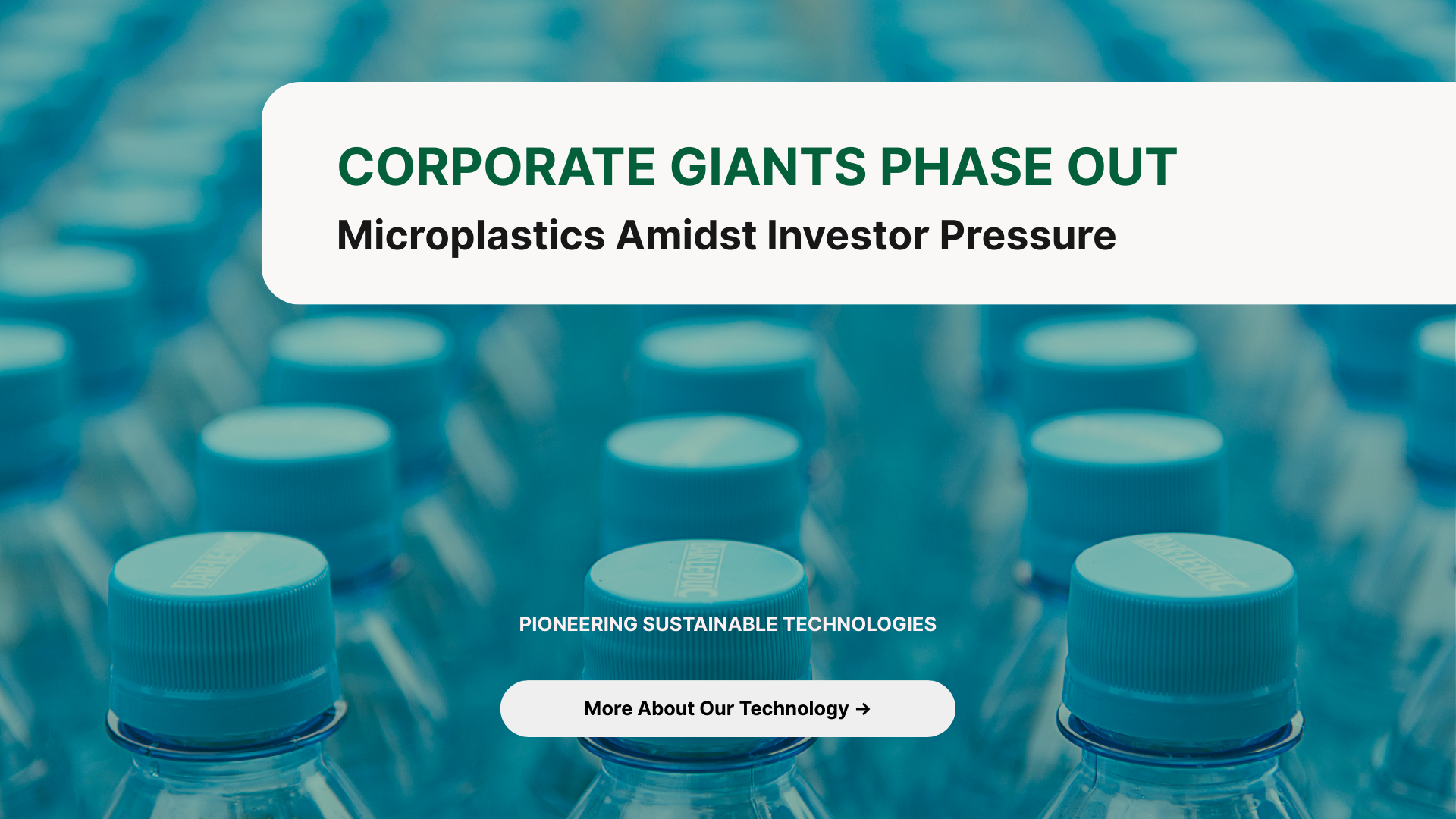From multinational food and beverage companies to global cosmetics and pharmaceutical firms, corporate leaders are accelerating their efforts to eliminate microplastics from supply chains. But this shift is not just about public image or consumer preference. It is being driven by financial risk, regulatory momentum and investor pressure tied to ESG benchmarks.
As scientific evidence grows linking microplastics to human health risks and ecosystem damage, brands are being forced to rethink their packaging, product formulations and sustainability claims. In parallel, institutional investors and ESG funds are demanding measurable reductions in plastic-related impacts as part of long-term risk assessment and ethical screening.
This article explores the strategic motivations behind this shift, the sectors most affected and why microplastic-free alternatives like Eco Bottle are now seen as essential assets in global product portfolios.
What Are Microplastics, and Why Are Corporations Responding Now?
Microplastics are plastic particles smaller than five millimetres that result from the degradation of larger plastic products or are manufactured intentionally for use in products. These particles are now found in drinking water, food, soil and even the human bloodstream, raising major concerns about toxicity, bioaccumulation and long-term health effects.
Recent scientific studies have linked microplastics to:
• Inflammation and cellular damage
• Disruption of gut microbiota
• Hormonal imbalances
• Increased risk of cardiovascular disease
• Potential neurotoxicity and developmental effects
With these findings gaining media attention, regulators, investors and consumers are demanding action. In 2024, the World Health Organization updated its advisory to include microplastic exposure as a potential public health concern. Meanwhile, the New England Journal of Medicine published a study revealing microplastics embedded in human arteries, associated with a 4.5 times higher risk of heart attack and stroke.
ESG Frameworks Now Include Microplastic Reduction
Environmental, Social and Governance frameworks have matured beyond carbon and energy reporting. Investors are now assessing company exposure to:
• Reputational damage from plastic waste
• Legal and regulatory compliance risks related to plastic use
• Lifecycle sustainability of packaging and raw materials
• Health-related liability from toxic product ingredients
• Greenwashing claims tied to vague recyclable or eco-friendly labels
Global ESG ratings agencies and investment funds are now scoring microplastic generation and mitigation as material metrics. Companies with exposure to banned or high-risk plastics may see their ESG scores downgraded, directly affecting shareholder value.
BlackRock, Vanguard and other major funds have included microplastic concerns in their ESG risk disclosures, especially for fast-moving consumer goods, health, beauty and bottled water industries.
Corporate Action: Who Is Phasing Out Microplastics?
Many of the world’s largest brands are already reformulating or retooling to eliminate microplastics:
• Unilever has pledged to remove microplastic ingredients from personal care products and explore fully compostable packaging
• Nestlé Waters has committed to reducing plastic use by 30 percent and trialling biodegradable bottle alternatives
• Procter & Gamble is testing bio-based packaging for key product lines
• Danone announced a roadmap to phase out fossil-based plastic in its Evian and Volvic water brands
• L’Oréal is investing in plastic-free cosmetic packaging and reusable systems
These changes are not only environmental. They are financial. Lawsuits and bans are rising. France, for instance, has already banned microplastics in rinse-off cosmetics, and the European Chemicals Agency is expanding restrictions across multiple industries.
Biodegradable Packaging: A Market Differentiator, Not Just a Compliance Move
With regulators moving faster than supply chains can adapt, brands that adopt biodegradable and microplastic-free packaging gain more than compliance. They gain:
• Brand leadership and ESG ratings improvement
• Preferred supplier status with government and institutional buyers
• Reduced legal exposure
• Enhanced consumer trust and engagement
• Access to sustainability-linked finance and insurance incentives
Eco Bottle, for example, is a 100 percent biodegradable, reusable water bottle that contains no microplastics, no toxins and no harmful residues. It is designed to break down safely in landfill conditions, without requiring industrial composting or complex collection systems.
Unlike traditional bioplastics or plant-based bottles that still contain fossil polymers, Eco Bottle uses a patented depolymerisation additive that enables full decomposition without fragmenting into microplastic dust.
The Role of Investors in Accelerating the Shift
Investors are no longer passive. ESG-linked shareholder resolutions are pushing for:
• Product-level transparency on plastic and chemical composition
• Independent lifecycle analysis and third-party certification
• Targets for plastic reduction, not just emissions
• Executive accountability on packaging innovation and safety
According to Morningstar, ESG funds now manage over USD 3.2 trillion in assets, and microplastic exposure is increasingly cited in risk filings. Companies that do not adapt face divestment, board pressure or capital reallocation.
As a result, ESG-driven sustainability is no longer about green image. It is about long-term viability and market access.
What’s Next: From Voluntary Goals to Global Regulation
The UN’s Global Plastics Treaty, under negotiation as of 2025, is expected to set binding rules on plastic production, transparency and waste. Microplastics are a core focus, with early drafts including:
• Mandatory disclosure of microplastic content in products
• Global standards for biodegradability
• Trade restrictions on microplastic-containing goods
• Financial penalties for companies that fail to meet phase-out timelines
For businesses, this means that voluntary ESG action today will likely become a legal requirement tomorrow. Being ahead of the curve is no longer optional. It is essential.
Key Summary
✓ Microplastics pose serious human health risks and are now a regulatory and investor concern
✓ ESG frameworks increasingly score companies on plastic exposure and mitigation
✓ Major brands like Unilever, Nestlé and L’Oréal are actively phasing out microplastics
✓ Investor pressure is pushing for certified, traceable, microplastic-free packaging
✓ Eco Bottle provides a certified, 100 percent biodegradable alternative
✓ Global regulation is on the horizon, and early adopters will lead the transition
References
WORLD HEALTH ORGANIZATION. Microplastics and Human Health. 2024.
NEW ENGLAND JOURNAL OF MEDICINE. Microplastics in Human Arteries and Cardiovascular Risk. Mar. 2024.
EUROPEAN CHEMICALS AGENCY. Restriction Proposal on Microplastics. 2024.
MORNINGSTAR. ESG Fund Trends and Microplastic Risk Ratings. 2024.
UNILEVER. Sustainable Packaging and Plastic Phase-Out Strategy. 2024.
NESTLÉ GLOBAL. Environmental Progress and Packaging Commitments. 2024.
THE GREENER TECH GROUP. Eco Bottle Material Analysis Report. 2025.

